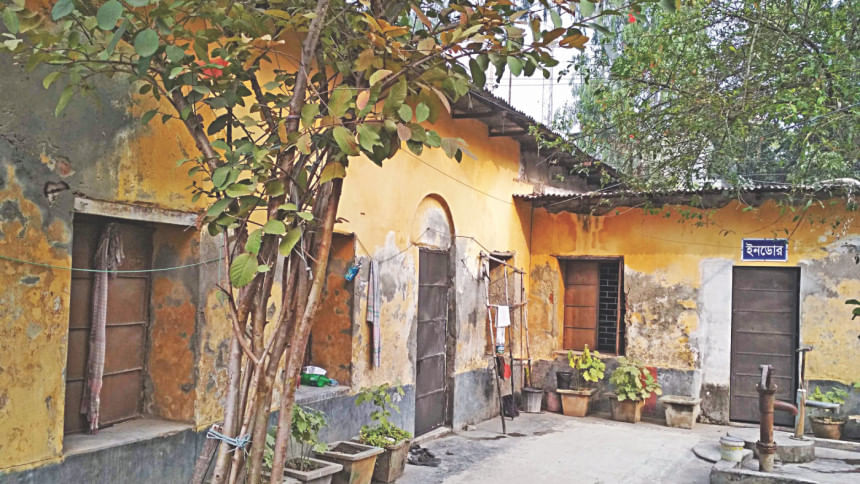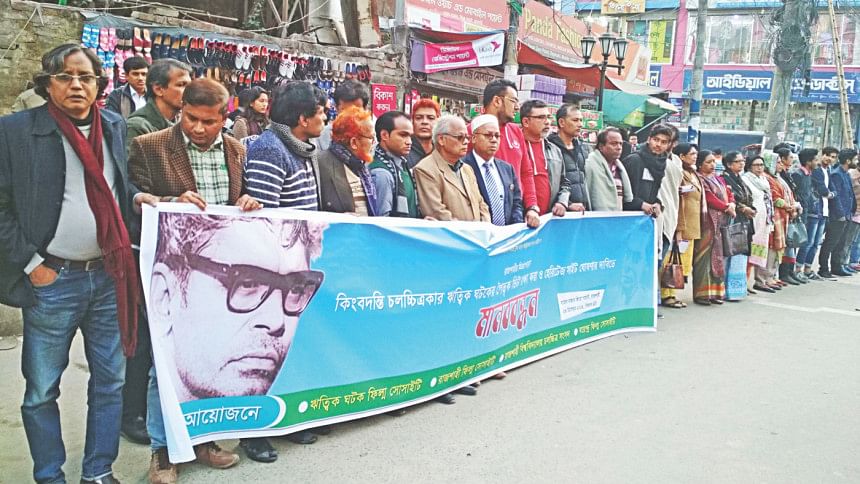Last trace of Ritwik Ghatak in Rajshahi being erased

Authorities of a homeopathic college are gradually demolishing the ancestral home of internationally renowned filmmaker Ritwik Ghatak in Rajshahi city’s Miapara area, sparking protests from social and cultural activists across the country.
Several hundred locals under the banner of Ritwik Ghatak Film Society formed a human chain at Shaheb Bazar Zero Point in the city yesterday afternoon, demanding immediate protection of the property bearing the filmmaker’s memories.
They called for declaring it a heritage site and establishing a memorial museum on the premises as done with legendary actress Suchitra Sen’s ancestral house in Pabna.

They submitted memorandums to the deputy commissioner of Rajshahi, city Mayor AHM Khairuzzman Liton, lawmaker Fazle Hossain Badsha and Cultural Affairs Minister KM Khalid highlighting their demands.
However, the authorities of Rajshahi Homeopathic College and Hospital denied that they are demolishing Ritwik’s house.
“The construction materials we found during demolition are modern, but Ritwik lived in Rajshahi in the 1930s or ‘40s,” Anisur Rahman, principal of the college, said.
During a visit to the site yesterday afternoon, this correspondent saw that the college authorities had already demolished part of the one-storey house and erected a boundary wall in the western side of the site.
The principal said the demolition started as the institute’s governing body -- headed by the deputy commissioner of Rajshahi -- decided to build a garage for vehicles there.
He said the property belongs to the college and the authorities needed to demolish the old structure -- making way for new classrooms and academic buildings.
“We couldn’t demolish all parts of the building due to financial constraints,” the principal said. He said the college was set up at the site on 34-decimal land in 1966.
In 1989, the Ershad government handed over the land -- classified as “enemy property” -- to the college. In 2006, the authorities demolished the northern part of the old building and erected a two-storey building.
On the south and eastern part of the site, the old building still survives.
“The surviving part of the building bears memories of Ritwik Ghatak,” Ahsan Kabir Liton, president of Rajshahi Film Society, said.
He said the college authorities destroyed most of Ritwik’s ancestral house over the last decade and nothing was done to stop this.
Born in Dhaka on November 4, 1925, Ritwik had to move to Rajshahi as his father Suresh Chandra Ghatak -- a district magistrate, poet and playwright -- was transferred to the city.
Ritwik’s father owned the building. Formative years of the filmmaker’s life were spent at the house, as he studied at Rajshahi Collegiate School. During his stay in the city, Ritwik edited a magazine called “Avidhara”.

He took part in meetings and cultural gatherings with litterateur Sarat Chandra Chattopadhyay at the premises of Miapara Public Library, adjacent to the house.
Renowned fiction writer Mahasweta Devi -- Ritwik’s niece -- also stayed at the house, Mahmud Islam Masud, general secretary of Ritwik Ghatak Film Society, said. “On different occasions, we invited Ritwik’s sister Protiti Devi and Mahasweta Devi to Rajshahi and they fondly recalled their memories of living in the house,” he said.
During the 1947 partition, Ritwik had to migrate to India with his family and the authorities later declared his ancestral home “enemy property” [now vested property].
Yesterday, Md Shariful Haque, additional deputy commissioner of Rajshahi, told journalists that they have instructed the college authorities to stop the work for now. “We’ll take a decision in this regard soon.”

 For all latest news, follow The Daily Star's Google News channel.
For all latest news, follow The Daily Star's Google News channel. 



Comments